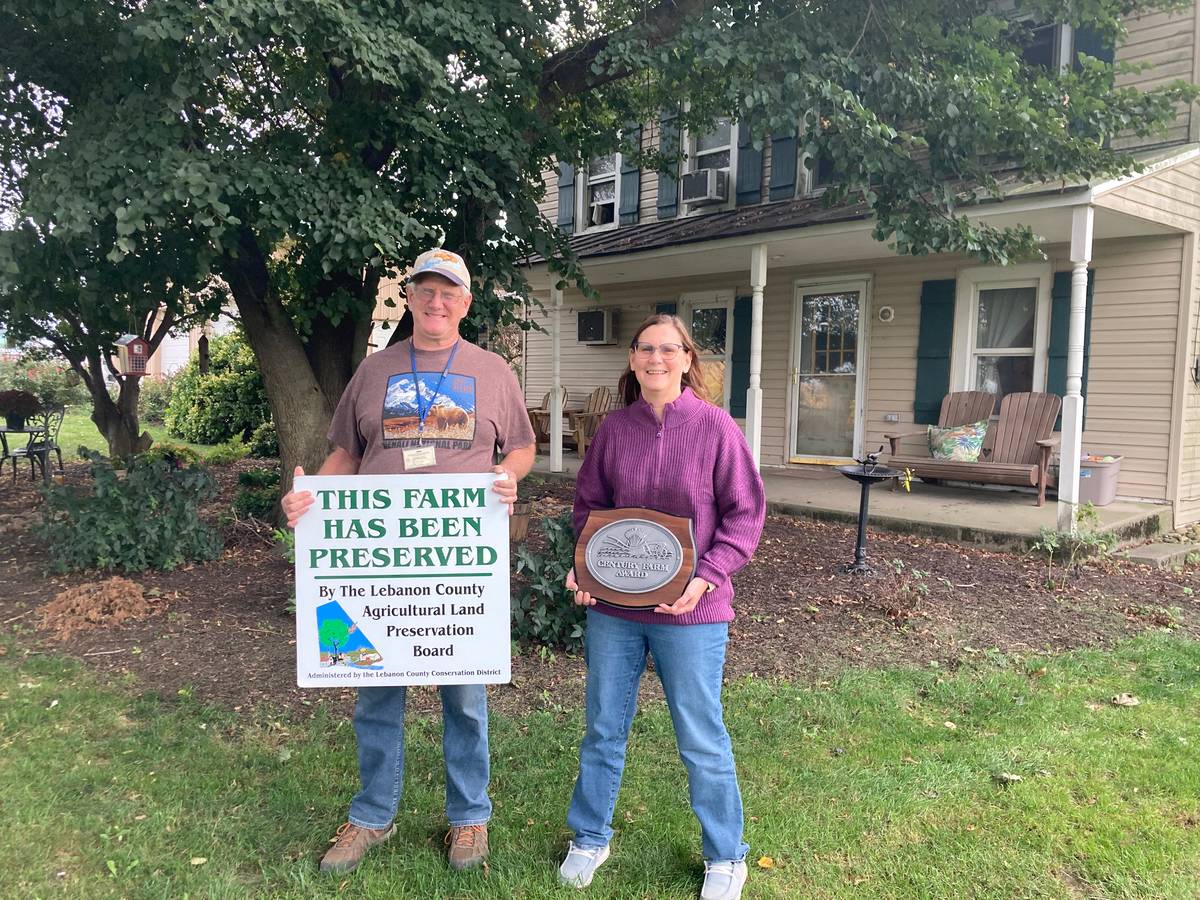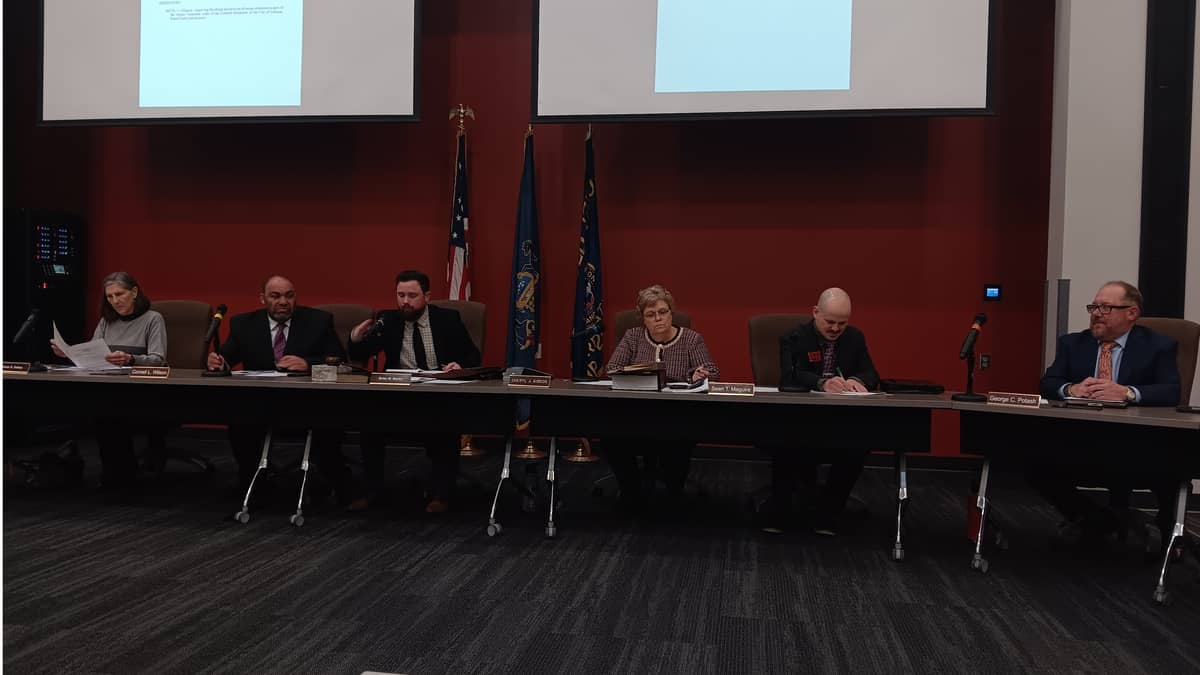When Lynn Struphar learned he could preserve his farm forever through the state’s farmland preservation program, there was never any doubt he would conserve his property.
“As soon as I heard about it, I liked the program and I got involved in it pretty quickly,” said Struphar, who farms nearly 140 acres along Route 934 in North Annville Township. “There were a couple of reasons I liked the program.”
Read More: Saving the land forever: Lebanon County farmland preservation program explained
For one, the fifth-generation, 150-year-old family farm was the only home Struphar had ever known. A dairy farmer for 40 years of his professional career, Struphar left what he calls a “tough business to make a living” and now farms 100 tillable acres, 50 in corn and 50 in soybeans on the farm he conserved in 2005.

“I was born and raised on the farm and lived there my whole life,” said Struphar. “I never want to see the farm sold for development. You see so much development around us, especially those ugly warehouses on the other side of (Route) 422.”
Read More: Your guide to the warehouses under construction in South Annville Twp.
Saying that North Annville Township is “strict about non-agricultural development,” Struphar added that four other farms near his are also enrolled in the preservation program. Stuphar’s farm is just south of Bellegrove along Route 934.
“Some farmers who are planning to buy a farm may prefer a preserved farm,” said Struphar. “A farmer coming into this area would know that there are other farms around him that are going to stay in farming. He would know those farms won’t become developments where people might complain about odor and other farming practices.”
Struphar added that Pennsylvanians need to support farmland preservation for the well-being of our local food supply.
“I believe it is important for people to understand that the population is growing and that farmland is disappearing for development and so forth, and I think it is really important for people to support land preservation for the future of our well-being and our food production,” he said.

The decision to preserve a farm, however, is a serious one, according to Craig Zemitis, agricultural preservation specialist for the Lebanon County Conservation District.
“For the application, not so much. I go over the general process of preservation and any questions they have because there is no contract being signed,” said Zemitis. “You can apply or leave if you want, but I don’t go into the heavy details until the offer letter. With the offer letter, I let them know this is a voluntary program, I don’t get a commission and I don’t benefit from you preserving as an individual. … ‘Cause you are right, we say it is preserved forever and a day, so there’s a lot to think about.”
Zemitis said he’s compiled a list of issues that farmers who have already preserved informed him were things they wish they knew before joining the program. He said he’s made that list so he can review those issues with farmers to be fully transparent.
“These may not be all of the things they will run into, but these are things people have called about,” he said. “So, I try to be as transparent as possible and provide as much information as possible so that they are making an informed decision.”
Two major decisions involve land subdivision and diversification of an agricultural enterprise.
“The big one is subdivision,” said Zemitis. “You are not allowed to subdivide a property once it is preserved in our county, this is county-specific. The only exception to that is for an additional residential structure, which can be subdivided into two acres. You can build one additional residential structure for the person living on the farm, for an immediate family member or for someone working on the farm, and you can subdivide off of that. That is the only exception.”
Farmers run into a problem when they want to subdivide their farms.
“Say you have 100 acres and you have two children,” noted Zemitis. “If you want to subdivide it into 50 acres each and give one part to each kid, you are not allowed to do that. So now you have to get into a trust or only give it to one kid, so there are questions about how that works.”
Diversification is another issue that Zemitis receives inquiries from participants.
“Rural enterprise is the other big one,” said Zemitis. “You can’t build a new building for a non-ag business, but you can repurpose a building.”
Zemitis said he’s encountered a request to turn a barn into a wedding revenue, which was permissible, but the same landowner wanted to add parking for event guests, which was denied since that would have turned farmland into a non-pervious use for a non-ag business.
“These are things that are on a case-by-case basis, so I tell people if it is something that has to be approved to please let me know,” he said. “People not anticipating what they will potentially do. If they want to do multiple businesses that are not just farming because they are trying to diversify, they think they have the option to do all of these things when they might not.”
Zemitis said individuals who are considering entering their property into an ACE should map potential future land uses and discuss it with him to make an informed decision.
“It’s just planning all of the different potential avenues for funds that you would want to do and how that works into agriculture,” he said. “The best way to say it is that there are restrictions for non-ag businesses that need to be discussed beforehand.”
As far as Stuphar is concerned, the 68-year-old knows the day will come when he can no longer farm his land, which has also been recognized as a Century Farm. But, for now, he still enjoys working the land, the same land on which he was born and reared.
“I still enjoy doing it. I still enjoy getting out on the tractor in the spring. I still enjoy watching the crops grow, but I know that there will come a time when I can no longer physically do it,” he said. “But it makes me feel very good, though, to know that it will stay in farming. It’s good to know that if I drive by it one day and I no longer live there that it is still a farm. That’s very important to me.”

Questions about this story? Suggestions for a future LebTown article? Reach our newsroom using this contact form and we’ll do our best to get back to you.

Build the future of local news.
Cancel anytime.
Monthly Subscription
🌟 Annual Subscription
- Still no paywall!
- Fewer ads
- Exclusive events and emails
- All monthly benefits
- Most popular option
- Make a bigger impact
Already a member? Log in here to hide these messages
Free local news isn’t cheap. If you value the coverage LebTown provides, help us make it sustainable. You can unlock more reporting for the community by joining as a monthly or annual member, or supporting our work with a one-time contribution. Cancel anytime.

























